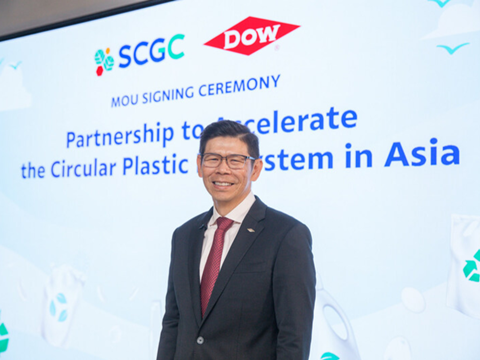
Dow and SCG Chemicals have signed a Memorandum of Understanding to accelerate advanced and mechanical recycling technologies in the Asia Pacific region – aiming to process 200kt of plastic waste annually by 2030.
In a bid to establish a robust materials ecosystem in Southeast Asia, the initial phases of this ‘first-of-its-kind’ agreement aim to develop solutions in waste sorting, mechanical recycling, and advanced recycling in Thailand. They also seek to establish a value growth partnership for post-consumer recycled materials with current suppliers.
The next stages intend to source plastic waste feedstocks beyond Thailand, potentially expanding into China, Korea, Japan, Taiwan, Australia, and New Zealand.
The partners claim to be the first in the Asia Pacific market to pursue a holistic value chain solution for plastic circularity. It is hoped that their efforts will improve waste collection, management, and recycling in the region; unlock high-value applications for a wider range of plastics; and drive circularity for end-of-life plastics.
Dow’s ‘Transform the Waste’ target intends to commercialize 3 million metric tons of circular and renewable solutions every year by 2030, using plastic waste and other alternative feedstocks to do so. Meanwhile, SCG Chemicals’ ‘Low Waste, Low Carbon’ initiative aspires for carbon neutrality by 2050; by 2030, it is targeting a 20% reduction in greenhouse gas emissions and a sales target of one million tons for its green polymer portfolio.
“Asia has one of the largest sources of convertible plastic waste,” explained Bambang Candra, APAC commercial vice president, Packaging & Specialty Plastics at Dow. “We want to disrupt how the region currently handles waste and structure a new model that values, sources, and transforms plastic waste.
“Our partnership with SCGC will enable both companies to be key players in enabling greater circularity in the region by leveraging our complementary portfolio, research and development capabilities, and technology licensing.
“Combined with our existing technical expertise in producing high-performance resins, our customers will also find value in the optimization of total cost in use, availability and quality of plastic waste across the materials ecosystem.”
Sakchai Patiparnpreechavud, chief executive officer and president of SCGC, continued: “This collaboration between SCGC and Dow marks a significant milestone where two leading organizations in sustainable plastics will join forces to drive and elevate the circular plastic ecosystem in the Asia Pacific region efficiently throughout the value chain. SCGC is ready to leverage its expertise in green polymer and compound technology to enhance the performance of plastic resins.
“This initiative aims to restore the value to used plastics according to circular economy principles through mechanical recycling and advanced recycling processes while maintaining properties that satisfy customers’ needs. This will enhance business potential and support the growing demand for high-quality PCR in the global market, from packaging to electrical appliances, reflecting SCGC’s Low Waste, Low Carbon approach concretely.”
“Dow Thailand is proud to begin a new chapter in our 57-year journey in the country with a groundbreaking circular economy partnership alongside our trusted partner, SCGC,” added Dow Thailand president Chatchai Luanpolcharoenchai. “Our 37 years of shared commitment to excellence and sustainability make SCGC the ideal partner to explore the new joint business opportunities, and together, we aim to further enhance the value we deliver to our customers and contribute to a sustainable future for the region.”
The news comes after Dow announced a joint development agreement with P&G in pursuit of a new recycling technology for hard-to-recycle plastic packaging. The partners have their sights set on ‘near-virgin-quality’ recycled polyethylene with a low greenhouse gas emissions footprint.
Still more recently, it has revealed its work with Freepoint Eco-Systems to source an annual estimate of 65,000 metric tonnes of ‘certified-circular, plastic waste-derived’ pyrolysis oil; this will contribute to the production of new, virgin-grade equivalent plastics in its Gulf Coast operations.
At the Sustainable Packaging Summit in November 2023, we united plastic recyclers from across the value chain – and indeed, across the world – to discuss how global collaboration could be the key to unlocking complete circularity.
If you liked this story, you might also enjoy:
How are the top brands progressing on packaging sustainability?
The ultimate guide to global plastic sustainability regulation














No comments yet